Drawing on economic, technological, labor, and environmental history, Kenneth Warren explains the birth, phenomenal growth, decline and death of the Connellsville coke industry--the region that made Pittsburgh steel world famous.
Hinweis: Dieser Artikel kann nur an eine deutsche Lieferadresse ausgeliefert werden.
Hinweis: Dieser Artikel kann nur an eine deutsche Lieferadresse ausgeliefert werden.

